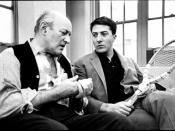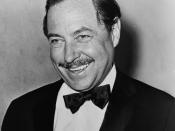One dreams, through the use of imagination, of what will become of them as life progresses. In some cases that person lives passionately with desires of self fulfillment, eventually reaching their goals in an ever so content way. At other times one remains lost, underappreciated, and ultimately carries with them a perilous, loathing attitude. Willy Loman drives his life to the point of no return where images of his past become his contorted reality. Amanda Wingfield slips on the white dress of her adolescence and is suddenly thrown back in time, living as if she were the young girl she once was at Blue Mountain. Death of the Salesman by Arthur Miller was published in 1949, only four years preceding Tennessee WilliamsÃÂ play of The Glass Menagerie. Interestingly enough, both plays begin with a glimpse of tragedy and end with self inflicted remorse. Although Death of the Salesman and The Glass Menagerie appear coincidently similar at first glance.
Upon a closer examination, it becomes evident that the similarities stretch beyond just the time of publication, but into analogous themes as well. In particular, both plays battle with the distinction between illusion and reality, the incapability of living in the present, and the desire for escape.
One uses their thoughts in times of vulnerability to manoeuvre through situations. This may result in even the revertion to the influence of narcotics to numb oneselves from what is truly taking place. In both plays it is perceived that the characters have trouble with distinguishing what is a figment of their imagination and what is reality. Amanda and Willy both deny their childrenÃÂs underachievement and faults and believe that the fate of their children lies within their hands. Thus, they imagine their children as being something they are not, in an attempt to hide their childrenÃÂs failures. Such illusions allow Amanda and Willy to feel successful in forming Laura and BiffÃÂs lives. Amanda denies Laura as a cripple and corrects anyone who believes her to be so, throughout the play. Willy influenced BiffÃÂs belief that he had been a salesman for Bill Oliver. Biff begins to question this after the meeting that never occurred. ÃÂHow the hell did I ever get the idea that I was a salesman there? I even believed myself that I was a salesman for him! And then he gave me one look and- I realised what a ridiculous lie my whole life has been! I was a shipping clerkÃÂ (Miller 104). In an effort to guide their childrenÃÂs lives, both Amanda and Willy believe they know what is best for their children. Amanda imagines that Laura ÃÂcouldnÃÂt be satisfied with just sitting at homeÃÂ (Williams, 85). Yet Laura wanted to stay at home, evident as she creates excuses for doing so and would rather play with the glass menagerie. Willy, like Amanda imagines he is doing the right thing as well. When Biff was in high school, Willy felt Biff need not study even though Bernard advised them that he ÃÂheard Mr. Birnbaum say-ÃÂ (Miller 33). Willy thought to himself that ÃÂwith scholarships to three universities theyÃÂre going to flunk him?ÃÂ donÃÂt be a pest BernardÃÂ(Miller 33)! WillyÃÂs thought on this situation was delusional and unrealistic. The characters are further illusive in what their position is in society as they climb the corporate ladder and follow the American dream. In The Glass Menagerie, Tom believes that Jim wont fall short of the white house. In reality, a factory worker such as Jim, becoming the next Roosevelt is preposterous. BiffÃÂs younger brother Happy presumed he was making something of him self and following the American dream of success and money. Happy believed him self to be an assistant buyer. Yet Biff makes his illusions fade and reality set in. ÃÂYou big blow, are you the assistant buyer? YouÃÂre one of the two assistants to the assistant buyer, arenÃÂt youÃÂ (Miller 131)? Furthermore through the use of illusion, the characters see themselves larger than reality.
Amanda always brags of her seventeen gentlemen callers (Williams 32) yet she was left by her husband. Willy believes himself to be popular and a well known salesman to the extent that when he arrives ÃÂ[he] never [has] to wait in line to see a buyer. ÃÂWilly Loman is here!ÃÂ ThatÃÂs all they have to know and [he goes] right throughÃÂ (Miller 33). Yet his sales do not justify this claim. ÃÂI averaged a hundred and seventy dollars a week in commissions,ÃÂ Willy argued. ÃÂNow, Willy, you never averaged-ÃÂ (Miller 82). The characters could not determine what was an illusion, and which, a reality. Often, other characters attempted to give hints of reality to the delusional others. These cues were constantly denied. Amanda was sure the gentlemen caller Tom had invited for dinner was going to fall in love, marry and save Laura all within a matter of a dinner. Tom tries to explain to his mother that Jim is not aware of LauraÃÂs existence and thus the chances of Jim saving his sister was slim. Yet, Amanda brushes off TomÃÂs leeway into reality and continues to believe Jim is the ÃÂoneÃÂ without ever having met him. As a result, Jim ends up engaged to a girl named Betty. Willy has the same attitude as Amanda, unaware of any hints coming in his direction. Near the end of the play, Willy insists ÃÂ[his] funeral will be massive! TheyÃÂll come from Maine, Massachusetts, Vermont, New Hampshire!ÃÂ Rhode Island, New York, New Jersey- [he is] known.ÃÂ Yet Ben continuously warns Willy that he ÃÂ[has] got to be sure [heÃÂs] not making a fool of [himself]ÃÂ (Miller 127). Willy pays no attention to this frame of reality. In the end, no one shows up to WillyÃÂs funeral, portrayed as Linda asks, ÃÂwhy didnÃÂt anyone come?ÃÂ as it was simply Charley, Bernard, Biff, Happy and Linda (Miller 137) and Willy looks like a ÃÂfool.ÃÂ Both plays depict the characters using illusions to better their realities.
In both plays, the characters become dependant and obsessed with memories of the past. As a result, both Miller and WilliamsÃÂ characters have the incapability of living in the present time. The characters resort to the past to compensate for what they presently lack. Amanda always reminds Tom and Laura of the ÃÂone Sunday afternoon in Blue MountainÃÂ (Williams 32). Amanda constantly makes reference to her one special day as it is seen through many of her following actions. When Jim is due to arrive for dinner, Amanda wears the same white dress she wore as a young girl. She then entertains Jim as she would have entertained one of her gentlemen callers years ago. Amanda is kind, sweet and her face glows, proving reliving her past allows for her happiness. Willy acts in the same way as Amanda. He relives the past by replaying it in his mind. Willy especially recognizes times where the relationship between him and his sons were at its peak. Willy enjoyed the time he spent with his sons the day they were washing his car. ÃÂI been wondering why you polish the car so careful. Ha! DonÃÂt leave the hubcaps, boys. Happy, use newspaper on the windows, itÃÂs the easiest thing. ThatÃÂs it, thatÃÂs it, good workÃÂ (Miller 28). Willy makes reference to this past memory as it is a time that he is teaching his sons, as a true American father would, while also spending quality time. In the present, WillyÃÂs sons no longer hold the same respect and eagerness to be like him, as they once had had for their father. Willy also remembers the time that ÃÂBiff [wore] a sweater with a block ÃÂSÃÂ, [and carried] a footballÃÂ (Miller 28) as it was a time where WillyÃÂs success as a father showed, raising his eldest son as a star football player. This memory compensates for BiffÃÂs present failure of unemployment. WillyÃÂs memory is much like that of JimÃÂs. Jim spends time with Tom as he is the only one that can justify what use to be Jim. Through Tom, Jim is able to relive his triumphant past as a star football player and a ÃÂgodÃÂ to the other high school students. The characters also place the onus of the present, on past events. What occurred in the past is often used as an excuse for the poor outcome of the present time. The photograph of Mr. Wingfield dominates the living room space. It is a constant reminder of his abandonment sixteen years ago and of AmandaÃÂs mistake much like LindaÃÂs stockings are a constant reminder to Willy of his mistake. Willy becomes angry at the site of LindaÃÂs stockings as ÃÂ[he] wonÃÂt have [her] mending stockings in this house! Now throw them outÃÂ (Miller 39) he would demand. Mr. Wingfields abandonment and LindaÃÂs stockings are reasons as that add toAmanda and WillyÃÂs life difficulties. Willy also blames BiffÃÂs unemployment and loss of identity on ÃÂif [Biff] hadnÃÂt flunked mathÃÂ (Miller 110) as he brings it up in conversation with Biff. Willy also believes that if he had gone to Alaska, he would have been doing much better than he was. ÃÂÃÂ in those days I had a yearning to go to AlaskaÃÂ (Miller 80). In WillyÃÂs mind, he should have lived a life like his brother Ben, who ÃÂwalked into a jungle, and comes out, the age of twenty-one, and heÃÂs richÃÂ (Miller 41)! Since Willy did not go to Alaska, he blames his misfortune and poverty on things that he ÃÂshould haveÃÂ done. Willy also blames small things that often represent the big picture of his life. Such minor details include, ÃÂI told you we shouldÃÂve bought a well-advertised machine. Charley bought a general electric and itÃÂs twenty years old and itÃÂs still goodÃÂ ÃÂ(Miller 73). In both plays the past has an even larger impact as past actions come back to haunt the characters. The pasts influence is so strong that it affects the charactersÃÂ abilities to function in their present time. Willy often hears the mocking voice of a ÃÂwoman[ÃÂs] [laugh] offstageÃÂ (Miller 118). He then replays Biff knocking on the hotel room door, his entrance and what he witnessed. At this point Willy puts blames himself for ruining everything. This makes Willy lose his sanity as he questions whether he is at fault for BiffÃÂs failure. Tom, much like Willy, becomes haunted by his past up on leaving the Wingfield house. Tom explains that he can not stop thinking about his sister, Laura. These thoughts stop Tom from being able to live as he is in constant repentance.
When living through pain, detriment, and agony there is no reason for one to remain. In both plays it is evident that the characters yearn to escape from their unbearable lives. They elude their realities through various routes. In The Glass Menagerie, TomÃÂs only immediate escape is the fire escape, where he goes to have time away from his psychotic mother. Yet TomÃÂs true escape is the movies where he visits every night. At the movies, Tom is able to identify with the heroes of the film. The film plot is TomÃÂs only source of adventure from his boring home life. The characterÃÂs also use the power of their minds to leave. WillyÃÂs immediate escape is that ÃÂhe- talks to himselfÃÂ (Miller 21). Willy talks to himself to leave his life and create his own atmosphere in which he is more comfortable. WillyÃÂs favourite atmosphere is one that involves Ben. Willy often holds conversations with Ben in hopes of useful advice from his brother. Although Willy believes Ben to exist, no one else can actually see him. Late one night, when Willy and Charley are playing cards, Willy says, ÃÂIÃÂm getting awfully tired, BenÃÂ as a stunned Charley asks, ÃÂdid you just call me BenÃÂ (Miller 44). Willy was speaking to Ben as if Charley was not even there. Yet Charley, who can not see the fragment of WillyÃÂs imagination, questions if he has misheard. LauraÃÂs escape is just as easily accessible as WillyÃÂs imagination. Laura escapes into the lives of her glass menagerie through her mind, like Willy, in which she keeps on display in the living room. Laura, like the beauty and fragility of the glass, must be protected from the harshness of reality. She sees herself as the unicorn glass figurine. She escapes by allowing it to symbolise what she stands for, different and ÃÂfreakishÃÂ in comparison to the other horses. BiffÃÂs escape is further from the mind. For Biff, his route is out West where he is happier than ever. There ÃÂtheyÃÂve got about fifteen new colts. ThereÃÂs nothing more inspiring or- beautiful that the sight of a mare and a new coltÃÂ (Miller 22). Biff depicts the West as something inspiring that influences him as a person. Out west is where Biff is comfortable and relaxed, as all the characters are in their places of escape.
Williams and Miller both wrote plays that run parallel to one another. Death of the Salesman and The Glass Menagerie appear coincidently similar at first glance, upon a closer examination, it becomes evident that the plays have analogous themes. In particular, both plays battle with the distinction between illusion and reality, the incapability of living in the present, and the desire for escape. Willy and Amanda both battle for control over not only their own lives, but the outcome of the lives of their children. Tom and Biff wander around aimlessly, looking for who they are and what they stand for. Laura and Happy see themselves as something that others do not. In both plays, the characters are able to control what is the most significant of all their powers and that is their imaginations.
[BOOK] Why survive?: Being old in AmericaRN Butler - 2002 - Johns Hopkins University Press[BOOK] Images de l'organisationG Morgan - 1999 - books.google.comAmiel M., Bonnet Fr., Jacobs J., Management de l'administration Angot H.,Système d'information de l'entreprise Analyse théorique des flux d'informationet cas pratiques - 4 e édition Binmore K., Jeux et théorie desjeux Bonami ...
The evolution of relationship marketing- âºjagsheth.net [PDF]JN Sheth, A Parvatiyar - International Business Review, 1995 - ElsevierRelationship Marketing is emerging as a new phenomenon. However, relationshiporiented marketing practices date back to the pre-Industrial era. In thisarticle, we trace the history of marketing practices and illustrate how the ...
[BOOK] Notebooks of the mind: Explorations of thinkingV John-Steiner - 1997 - books.google.comForeword Reading Notebooks of the Mind recalled an incident, a peaceful momentin World War II. During a long voyage on a troopship, a few people who likedpoetry somehow met each other and found in the ship's library Edna St. ...





